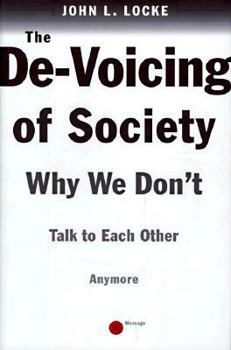The de-Voicing of Society: Why We Don't Talk to One Another
Select Format
Select Condition 
Book Overview
Overwhelmed by e-mail, voice mail, faxes, and information of all kinds, individuals today run the risk of forgetting how to talk to one another. This witty, provocative book explains why people are in danger of becoming a depersonalized society that has lost its voice.
Format:Hardcover
Language:English
ISBN:0684843331
ISBN13:9780684843339
Release Date:September 1998
Publisher:Simon & Schuster
Length:256 Pages
Weight:0.90 lbs.
Dimensions:1.1" x 6.5" x 9.6"
Customer Reviews
3 ratings
from the bottom-up
Published by Thriftbooks.com User , 21 years ago
Having read the other reviews, it is evident that the main argument against reading this book is that it reduces today's complex problems into an interpersonal issue that is "too simplistic".I don't deny that our problems as people and as societies are complex, but I do not think that such complexities are enough to dismiss the interpersonal elements that form our social foundations, even if they seem relatively insignificant. I find that akin to telling a person that "they don't matter", that any one person is incapable of forming change.This is a book. Any copy of the book is designed for one reader at a time. So it is supposed to hit the reader as a person, in a grass-roots sense. I found that it was a good explanation when I observed my own behaviors and manner of thinking. I'm a young adult; and I would much rather help myself, my family, and my community from the bottom-up than the top-down.I think this book greatly reinforced that attitude.
The problem with the Growing WWW
Published by Thriftbooks.com User , 24 years ago
I would not consider myself to be a tech junkie, but I do know my way around a computer, software, and the internet. After reading Locke's book, I was able to put into words what I could not before on where I think the internet is headed. I agree with Locke that we are losing our voice. Instead of meeting someone to talk or calling them on the telephone, we are sending them an e-mail. This is not a big problem now, but in ten years, there will be a noticeable difference in society. If society keeps going at the pace it is right now, we will lose the ability to communicate without the use of a computer. Locke's book is a wake-up call.
Technology--Too Much Of A Good Thing?
Published by Thriftbooks.com User , 24 years ago
This is one of the most fearless yet frightening technological ages we are privledged to live in. We can zap off an e-mail to Grandma with cute lil pix attached--and not have to hear her inquiring personal curiosities. We can leave a message on a business colleagues text pager--without explaining why we cannot make that 5 pm meeting. Our children can hide behind a pixeled monitor and act like they are tough teens with their verbage of garbage--and feel they can do the same amongst society. This amazing book delves into a subject which is coming to the forefront. Just what are we losing by being so advanced in communications? Alot. Rich moments of physical contact, eye contact, a closeness of the human spirit which propels us to care. Everything is becoming too cold now, impersonal. Don't get me wrong, I have a fax, computers, pagers, cell phones and use them all. I also took a hard look at myself and others who enjoy such "toys". I like taking the easy way out. And the more e-connected I am--the more I lose in communal inspiration.Author , John Locke, explains that talking, simple talking, a la sitting on the bench in front of the old soda shoppe, pulling back a swig of an icy bottle of root beer, discussing something as simple as the weather or the school bake sale, builds and maintains relationships. Without the personal touch, we are losing sense of self. We are becoming a tunnel visoned society. Not that these wonderful inventions are not helpful or needed, but at what cost?I was on a cruise ship a few months ago. Before we left port, I was sitiing on the aft deck, relaxing, people watching, anticipating making new acqaintances. As I looked around, I counted at least 20 people on their cell phones. I shook my head, checked my purse, I had my Nokia--turned off. Thank goodness after embarkation, those phones did not work. My gosh, people were actually forced to talk to one another! And it was fruitful to be reminded that asking questions, listening, looking into someones eyes as they bragged about this or that--was a lost pleasure, the lost art of conversation.I agree with the contents of this interesting profile by this psycholinguist. In fact I applaud it. It's the old story, let's get back to basics. Put the world on hold & let's talk, really talk. Before we just become faceless machines to one another.Thanks for your interest & comment votes--CDS






